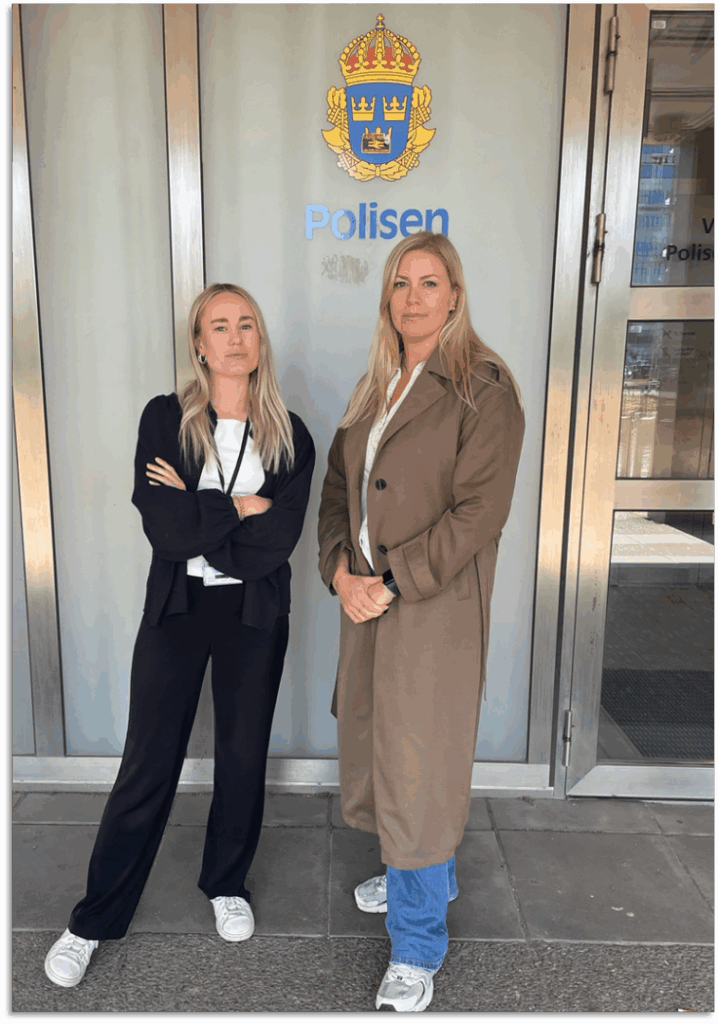Fraud is one of the most common crimes in Sweden, and there has been a significant rise in reported cases in recent years. According to the National Fraud Center, over 60,000 fraud cases were reported in the first quarter of 2025, representing a 6.52% increase compared to the same period in the previous year. Despite advancements in technology and ongoing efforts to combat fraud, the clearance rate for these offenses remains low. The complexity of online fraud, which operates in virtual environments where scammers can conceal their identities, adds to the challenge. Legal obstacles, such as data-sharing limitations between sectors and countries, further complicate police cooperation. Nevertheless, there have been notable successes in tackling these crimes. Investigation leader Emelie Carlström and investigator Evelina Nilsson share their experiences regarding a breakthrough in a complex fraud case they have been working on.
The case overview
The case involves a phone scam that utilized social engineering to target elderly citizens by impersonating employees of a debt collection agency. The fraudster misled victims into believing they owed money for mobile phones ordered using their Digital-ID. When victims denied authorization, the callers pretended to connect them with their banks for assistance. Another fraudster, posing as a bank representative, convinced victims to use their Digital-ID, leading to unauthorized fund transfers to accounts controlled by “money mules.” These mules laundered the stolen money through purchases of gold, cryptocurrency, or cash withdrawals, ultimately redirecting the assets to those behind the scheme.
Investigator Nilsson recognizes that fraudsters employ various tactics and continuously adapt their strategies as law enforcement focuses on specific types of fraud, creating an ongoing challenge for authorities.

Photo: Swedish Police
Key developments
Carlström and Nilsson accessed hundreds of notes related to the criminal activities, leading to the arrest of two individuals, suspected to be leaders of the fraud network. This network is accused of defrauding 139 elderly individuals out of a total of 17 million kronor SKR through various call centers located in Malta, Panama, and Thailand. Investigators have mapped the network and linked the group to an additional 50 reported fraud cases, utilizing extensive lists detailing the amounts amassed, flight bookings, and communications among the suspects.
“The successful access to the suspects’ phones and the securing of information was crucial, as it revealed detailed notes documenting their operations” said Emelie Carlström.
The investigation began two years ago when an investigator from Gothenburg traced several cryptocurrency transfers linked to money laundering. This inquiry revealed that all transfers led to a single individual. By examining additional payments, the investigator linked the suspect to numerous reported fraud cases, requiring extensive effort to piece together the evidence.
Importance of collaboration
Collaboration with colleagues from other Swedish regions and international Law Enforcement Agencies has been vital. Carlström emphasizes that access to the right resources, and working alongside experts in fields such as cryptocurrency tracking, analysis, and financial investigation has been crucial in solving the case.
The impact of fraud
The impact of fraud on individuals can be devastating, leading to significant financial loss, emotional distress, and a profound sense of violation. Many victims may face long-term financial instability and anxiety as a result of being defrauded. The psychological impact can lead to feelings of shame and isolation, making it difficult for victims to seek help or support. Furthermore, these experiences can erode trust in authorities and institutions, as victims may feel abandoned or unsupported in their time of need.
“Always report any fraud or attempted fraud to the police. Remember, you are not alone in being targeted, and there is no shame in this; fraudsters are skilled professionals.” Carlström and Nilsson advised.
Broader implications
The consequences of fraud extend beyond financial loss; it serves as a lucrative engine that funds various criminal activities, acting as a catalyst for more serious organized crime. The profits generated from fraudulent activities are often reinvested into the drug trade and arms trafficking. Analysis from the National Fraud Center in the report “Organized Fraud, 2023,” indicates a concerning connection between fraud and incidents of lethal gun violence, underscoring the broader implications of these crimes on public safety.
According to Emelie Carlström it is unusual for victims to recover lost funds, since the likelihood of fraud cases against individuals being solved is very low. Investigators Carlström and Nilsson are pleased to have seized gold, watches, cars, and other assets purchased with the money the suspects are believed to have obtained through fraud, with a total estimated value of between 10 and 12 million kronor. Nevertheless, the seized assets present an opportunity for victims to reclaim their money if the suspects are convicted.
Tips to protect yourself against scam calls:
1. Hang up
If someone calls you and you’re unsure who’s calling, just hang up. Fraudsters often claim to be a relative, or from your bank, a company or an authority.
Prepare something to say to end the call quickly, or simply hang up. You don’t need to be polite.
2. Don’t log in
Never identify yourself with your bank eID or share codes from a bank token or payment card at someone else’s request.
Respectable companies, organisations and authorities would never contact you and ask you to log in or share personal data this way.
3. Don’t trust the caller
The fraudster may try to make you anxious by saying that you’re about to lose money or that a relative is in trouble.
Don’t trust the caller even if they seem believable and have personal information about you.

Here in the Swedish Police website, you will find information, tips, and videos on how you can support your elderly relatives in protecting themselves against fraud.
Be safe!
Swedish Police Authority
